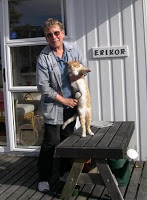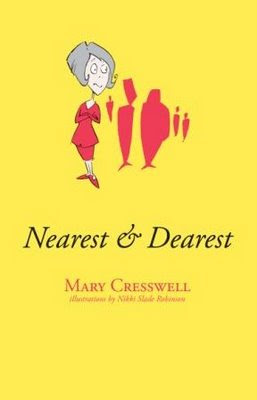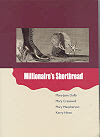This is the first of three interviews I will be running over the next few weeks with New Zealand poets whose first solo books of poetry are being launched on or near Montana Poetry Day on Friday 24 July.

Mary Cresswell is a Wellington poet who lives on the Kapiti Coast. She came to New Zealand from Los Angeles in 1970, after having lived in various parts of the US, in Germany, and in Japan. She graduated from Stanford University in California with a degree in history and English literature. She is a freelance science editor and proofreader and has spent at least one lifetime in the Wellington workplace.
Her first book appearance was with Mary-Jane Duffy, Mary Macpherson, and Kerry Hines as co-authors of Millionaire’s Shortbread, published by the University of Otago Press in 2003. This book is illustrated with collages by Brendan O’Brien, has an afterword by Greg O’Brien, and introduced these four poets to the Wellington scene.
Mary, your first solo book of poetry, Nearest & Dearest (Steele Roberts, 2009, NZ RRP $19.95, illustrated by Nikki Slade Robinson) is a book of humorous poetry, which is a side of your work I’ve not seen before. Have you always written humorous poetry alongside your serious poetry, or has that been a recent development?
The opposite, actually. I stopped writing serious poetry when I was about 17 and only took it up again the year I turned 60. All the years I didn’t write serious poetry, I’ve frequently come up with silly stuff for friends, for occasions in the office, or for family. That’s been a constant. I just wish I’d kept copies!
How did you become involved in writing poetry? Which poets have been most influential on your writing?
I was raised in a family where capping verses (usually limericks) was a standard indoor sport, so I have emitted poetry as long as I remember. Important poets? My sense of rhythm owes a lot to Anon. and to Cole Porter. My parents lived on folk songs and cabaret songs, hence my need for accentual (rather than accentual-syllabic or free) verse. Individual poets: Lewis Carroll, Auden, Eliot, Poe, Dorothy Parker, Donne, Walter Scott, Byron, Longfellow, Ogden Nash, Sidney Lanier… for starters. These days I’m reading Kay Ryan, Marie Ponsot, Robert Alter’s new translation of the Book of Psalms, among others.
“Humour” and “playfulness” are not words often used to characterise the literary scene in New Zealand. Indeed, there seems to be a view here that purse-lipped seriousness is the only acceptable literary stance. Have you run foul of such attitudes, or is this just me being paranoid?
I think “literary” is the operative word here, and no, you’re not paranoid. But this isn’t poetry’s fault: A lot of people last thought seriously about poetry in the fifth form and settle for genteel obeisance to Beauty and Nature when they think of it at all; light verse is for greeting cards, and they can’t imagine a serious message coming via humour. — And there’s also literary fashion. Humour is difficult in personal-experience poetry written in free verse, with no formal aspect. In New Zealand, we have to go back a generation to, say, Denis Glover to find a top poet writing humour, especially black humour, with a sting in it. Was Glover ever considered literary? I don’t know; I wonder if his contemporaries kept him in a category of his own.
Not many Americans write poems that feature cricket, such as “Willow Green Willow” in Nearest & Dearest. Do you now feel thoroughly ‘acclimatised’, if I may use the term, as a New Zealand poet?
After forty years in New Zealand, I’m about as acclimatised as I’ll ever be. I switched to correct [sic] spelling early on, though my spoken accent will never change much. I’m not sure, though, if any poet can or should aim for the mainstream. I know that both Americans and Kiwis think I don’t really belong, and the discomfort that comes from this seems to keep my satiric side alive and healthy.
Several of the poems that I most enjoyed in Nearest & Dearest are parodies of or based on other poems, several from the Victorian era. I know I like reading these – what attracts you to writing them?
They’re easiest to get started. Many of them (like the office manager’s Shakespeare sonnet (see below) or playing games with Wordsworth in the ‘Pass at Grasmere’) are based on poetry I read years ago, and they’re part of my sensibility in a way more recent poems aren’t. So a phrase—a few lines—perhaps a rhyme for ‘schadenfreude’— will pop into my mind by surprise; then I spend hours and hours trying to polish a humorous poem that also is a credit to the original.

Your poem “Metastasis” appears in Voyagers: Science Fiction Poetry from New Zealand, and you work as an editor of science publications. How much of an influence has science had on your poetry? Would you describe yourself as a “science poet”?
Not a “science poet” in that I rarely take scientific principles into account; “Metastasis” is a bit aberrant. I take notes of and am definitely influenced by goofy-sounding phrases I run across in the course of proofreading fearsomely technical material. (Who would be a “ring-based indole”, I ask you?) The US magazine Umbrella publishes an annual light supplement, Bumbershoot. This poem: http://www.umbrellajournal.com/summer2009/bumbershoot/light_verse/LabNote.html reflects a temporary passion for technical terms beginning with “Sq”.
Are copies of Nearest & Dearest available in bookshops yet? If so, where can people find it?
Absolutely. In Wellington, try Unity Books; Moby Dickens and Paper Plus in Paraparaumu; Bruce Mackenzie’s in Palmerston have it for sure. Books a’ Plenty in Tauranga. If you don’t see it on the shelf, ask for it. Supporting your local bookseller is admirable, virtuous, and a sign of high intelligence. If all else fails, the book’s available from the publisher and from Fishpond.
Finally, what’s next for Mary Cresswell as a poet?
Write more. Read more. Read more. Write more.
Watch this space.
THE OFFICE MANAGER ADDRESSES HER MIRROR
by Mary Cresswell
Shall I wear the Gucci scarf today?
It’s far more lovely and more corporate
than what sleek young managers affect
in all the offices up and down the way.
It gives an air of strength, they always say,
classic looks for classic power dressed,
Look and feel and act as though you’re best
and the rest will follow, as the night the day.
No dangly earrings! What women call
postmenopausal zest, in other places
gives a bad impression overall.
I will notice all their airs and graces,
a quiet woman, not looking to outwit them…
I shall run the show before they know what hit them.
This interview is the first stop in Mary’s “virtual book tour” for Nearest & Dearest. The next stop is on Janis Freegard’s blog.

